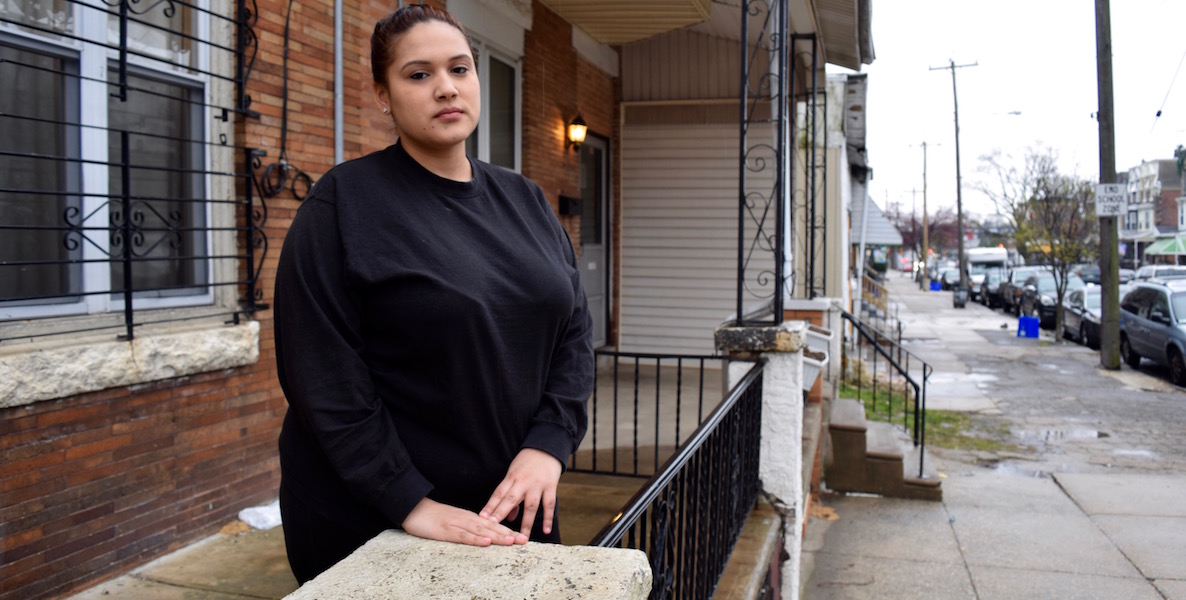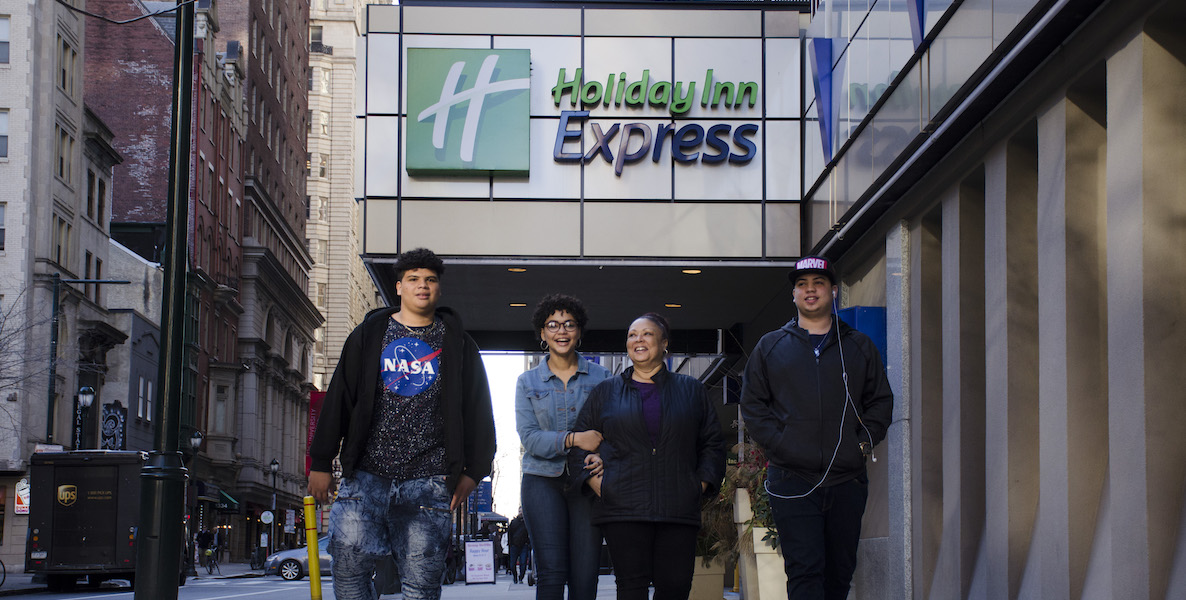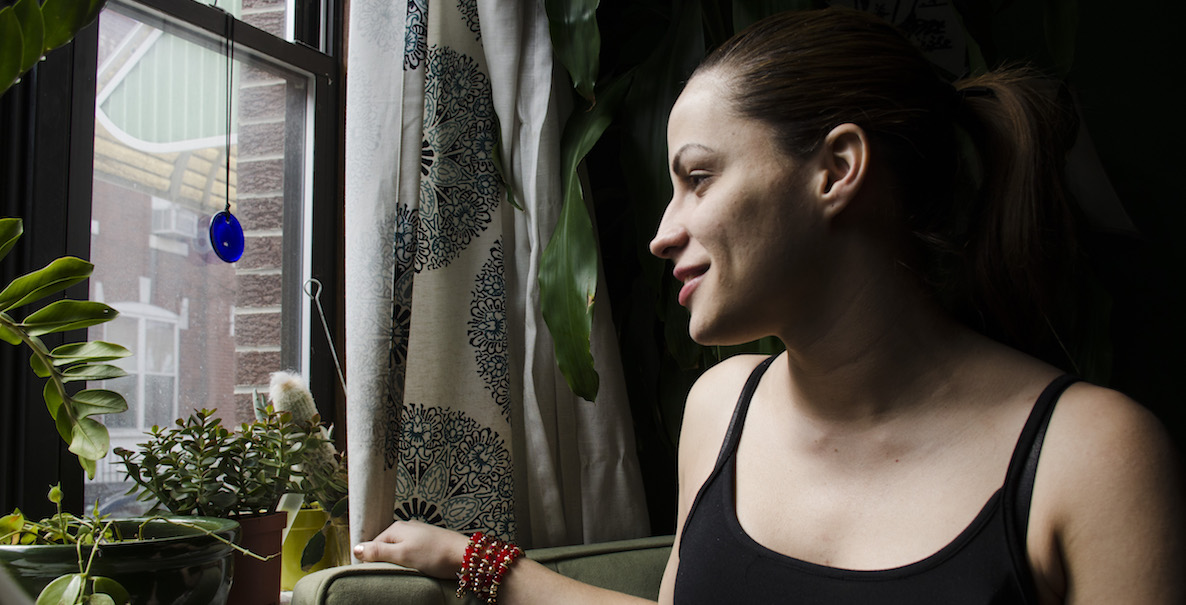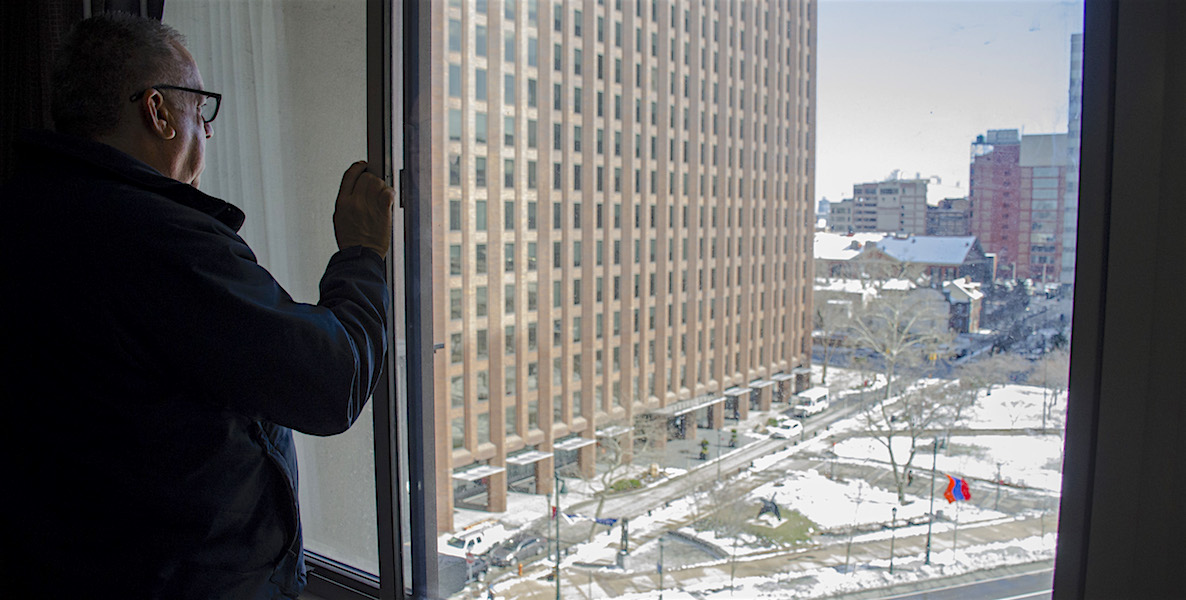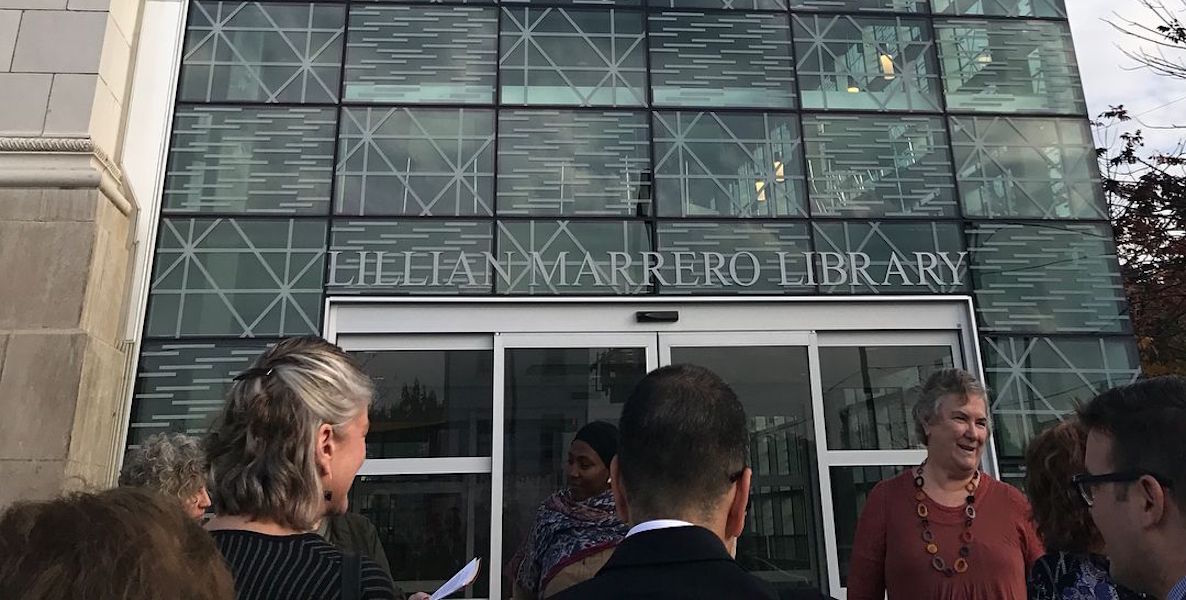Inside North Philly’s Lillian Marrero branch of the Free Library, community organizer Tania Ríos Marrero—daughter of the branch’s namesake—scribbles neatly at the top of a notebook: “What is the role of a public library?” Word by word, she dissects the meaning of her message. “Role: Function, purpose. Public: Social access, people, safety, society.”
At the nearby computer lab, one of the library staffers explains to an elderly Latino man how to access social security benefits online. High school students laugh together as they gather around a table doing their homework. A man in a comfy chair sifts through the daily newspapers. Puerto Rican hurricane evacuees wait in line for staff to help them navigate their new lives—everything from housing and jobs, to accessing federal emergency programs and other services.
Ríos Marrero looks around and smiles. Finally, “Library? What is that?” she says. “I think that a library is a tool, and a tool is to be used by the community to serve community purposes.”
“Libraries are essential to under resourced communities,” Moody says. “They shape the community and the community shapes the library.”
Lillian Marrero is one of Philadelphia’s 21st Century Free Libraries, a groundbreaking initiative to rethink how libraries serve their neighborhoods in today’s world. That has come to mean much more than just lending books, especially in poor communities with a lot of need—to pivot from being “citadels of stuff to externally-facing, outwardly-reaching organizations designed to help create excitement and civic engagement around the collections we have,” as Free Library Director and President Siobhan Reardon puts it.
Launched with a $25 million grant from the William Penn Foundation, the project aims to achieve many different kinds and definitions of literacy—financial, social, emotional, digital—for different populations: job seekers, entrepreneurs, new Americans, children under five, people with disabilities. So far, four neighborhood branches have relaunched as community hubs, serving the particular needs of their communities.

Prefer the audio version of this article? Listen to this story in CitizenCast below:

In South Philly, for example, Children’s Hospital of Philadelphia spearheaded a public-private venture that opened a new branch under CHOP offices and a public health center, with a brand new rec center and playground next door—offering health and literacy services to the whole family. Tacony Library reopened last year with a small business resource center, to help community members start, manage and grow their business. And work is underway at the Parkway Central branch to create a series of community spaces for teens, business owners and others; they are slated to open in the fall.

For Fairhill’s Lillian Marrero branch, re-opened last November after 18 months of renovations with a new glass-enclosed gathering space, this has meant confronting the issues facing some of the city’s poorest and most disconnected residents. On North 6th Street, the branch serves as a coincidental border between neighborhoods: To the east, Puerto Rican flags fly on every block, but Dominicans, Ecuadorians and Colombians have also found their way. The west side is mostly African American. The 19133 zip code where the building sits has up to 80 percent poverty rates in some areas.
But even before its renovations, the branch has long been a model for how libraries can go beyond books to serve their constituents—work started by Lillian Marrero, when she was head librarian from the 1990s to 2005. Originally from Puerto Rico, Lillian Marrero moved to Philadelphia at age 30 with her husband, who was pursuing a PhD at Temple. She jumped around different branches before finally settling into the formerly-named Lehigh Avenue branch.
![]()
“Whatever gave and held life, that was her love language, her life work,” says Ríos Marrero of her mother. Lillian would arrive early to clean up the trash that piled up around the library overnight, a symptom of the neighborhood’s larger issues with littering. Inside the space, she kept potted plants and flowers. It was her hands that planted the magnificent trees that still stand today outside the building.
Lillian nurtured the library so it would give life to its Fairhill community. She helped North Philadelphians find housing, hunt jobs, learn English, develop digital skills—long before any of that was a mandate of the library system. She was a “guiding light who laid the groundwork for what we would hope is a model of community engagement for the libraries,” says Joe Bedford, deputy director of customer engagement at the Free Library.
It’s this same deep community engagement the library’s current supervisor, Mieka Moody, brings to the work. Like many of the library’s constituents, Moody is an African American, Muslim woman raised in North Philadelphia. This July, she will have worked at the Free Library for 20 years. She applied to her first job to make ends meet as a young mother with two daughters. In time, she understood the significance of a public library in a poor, urban community.
21st Century Libraries aim to achieve many different kinds and definitions of literacy—financial, social, emotional, digital—for different populations: job seekers, entrepreneurs, new Americans, children under five, people with disabilities.
“Libraries are essential to under resourced communities,” she says. “They shape the community and the community shapes the library.” Moody eventually continued her studies with the Free Library’s support and became a librarian.
Moody shares many of the lived experiences of the folks who use the the space, which influences her work. “I can relate to people coming in and looking for jobs, people in survival mode,” she says. She recently organized a wellness circle for women of color, mostly attended by African American women. “We taught yoga, Afro-poetry, meditation, and more,” she says. For a group of low-income, black and brown women who aren’t often afforded down time, the initiative was a radical learning experience in self-care.
![]()
Since the fall, Saturday mornings have brought activists and staff members to Fairhill to help hurricane evacuees, sometimes dozens in a day. Every Wednesday afternoon, it hosts a free farmers market outside with Philabundance. Staff members and neighbors have planted a community garden. The branch hosts weekly yoga and science classes for kids during the summer, hip hop workshops, e-mail tutorials, movie nights and other events planned by the staff to answer questions and gather the community.
Lillian worked at the library until the end of her life. She had a cancer in her leg that wouldn’t go away. But even through the surgeries and procedures, she dutifully showed up to fulfill her responsibilities each day. “Her life’s devotion was this library,” Ríos Marrero says. “She went too soon, she wasn’t done at the library, and she wasn’t done with her work in the community.”
Today, on the other side of Lehigh Avenue is a mural of Lillian Marrero. She stands proud and smiling, with a rainbow guacamayo on her left elbow and an open book in her right hand. Green vines spill out unto the wall, firmly rooted in the text she is holding. Strings of words hang delicately from the plant’s bright green, spiraling limbs: Gente. Amistad. Educación. Ayuda. Empleo.
Lillian Marrero Facebook


